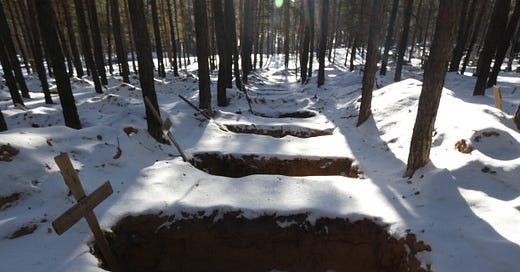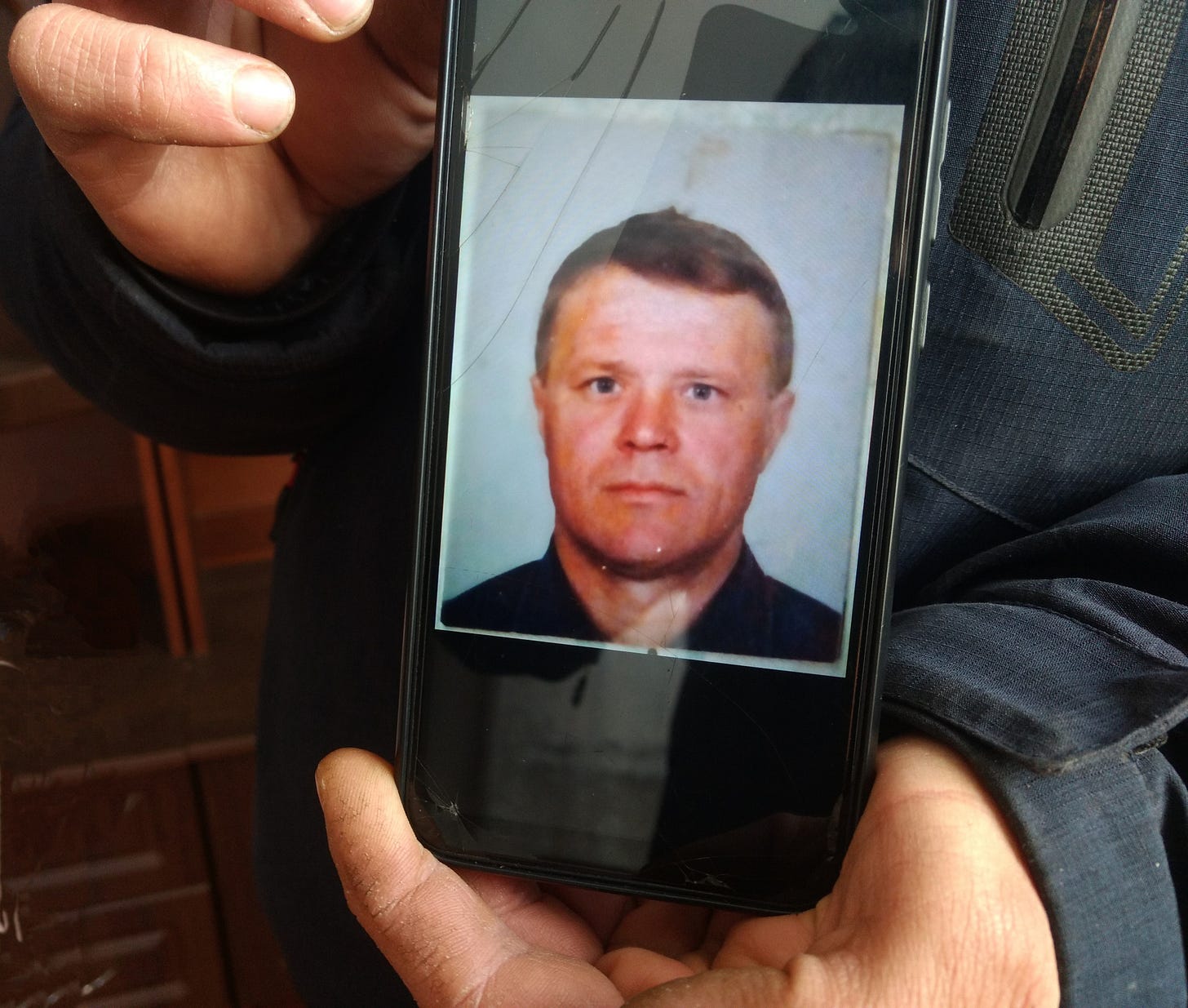Moral support and movie awards are not enough
“20 Days in Mariupol” is up for an Oscar this weekend. Ukraine needs more than long-distance accolades.
Russian soldiers dumped almost 450 bodies at a mass burial site that Ukrainian forces discovered after liberating the eastern city of Izyum in fall 2022. (c. Martin Kuz)
The artillery shell landed outside Nikolai Chubko’s home as he slept. Shrapnel tore through an exterior wall and the door to his bedroom before ripping into his chest and legs. Weakened from his injuries, he strained to reach his phone to call his son, Alex, who lived in another part of Izyum.
Russia’s attack on the city in eastern Ukraine began that morning two years ago, the fourth day of the full-scale invasion. Alex drove to his father’s house through a heavy rain of missiles and rockets. He found Nikolai sprawled in bed, blood leaking from his body as he gasped for breath.
A hospital administrator, Alex cleaned and bandaged his father’s wounds, struggling to ease his pain. He called doctors he knew and learned that most had fled. One who stayed told him the Ukrainian army would need most of the available medical supplies and equipment. Civilians would have to make due. The doctor visited the Chubkos and provided antibiotics and painkillers, along with a measure of solace. Then he wished them luck.
Alex shared his story when we met in Izyum a year ago, and recently I thought of him and his father while watching “20 Days in Mariupol.” The harrowing film — nominated for best documentary feature at this year’s Oscars, which take place Sunday — focuses on Russia’s assault on the southern port city of more than a half million people at the war’s onset.
Three Associated Press journalists remained in Mariupol after all other international reporters evacuated. The team captured footage that reveals the disbelief and despair of Ukrainians — and the courage of troops, emergency workers and medical personnel — as the Russian noose tightens.
In several wrenching scenes inside a hospital, doctors and nurses treat residents wounded by shelling. Early on, as a distraught mother begs doctors to save her young daughter, a surgeon in the operating room stares into the camera and gives voice to a nation’s enraged anguish.
“Film how these motherf------ are killing civilians. Show this Putin bastard the eyes of this child and all these doctors who are crying,” he says in Russian. “Rotting bastard. That’s how he saves people. Show it. It’s good that there’s press here. Keep filming.”
Nikolai Chubko died in a less abrupt but equally pointless manner. After enemy forces overran Izyum a month into the war, Alex brought his father to a school that the Russians had converted into a field hospital. Nikolai stayed there overnight, and the next day, a Russian doctor assured Alex that he had removed the shrapnel from Nikolai’s body and found his major organs unharmed.
Less than 48 hours after returning home, Nikolai lost consciousness and never woke up. The retired security guard and avid fisherman succumbed to pulmonary edema at age 59. “My father would be alive if not for the war — if not for Putin,” Alex told me. “These are the hardest emotions I have ever felt.”
Alex Chubko holds a photo of his late father, Nikolai, who died in the city of Izyum in eastern Ukraine from shrapnel injuries he received in the first days of Russia’s full-scale invasion. (c. Martin Kuz)
In “20 Days in Mariupol,” a Russian blockade has cut off the flow of medical supplies, forcing doctors to ration care. Limbs and lives are lost. Alex watched a similar fate befall the loved ones of friends and neighbors unable to obtain treatment during the siege and occupation of Izyum. “So many people have trauma,” he said, his clear blue eyes unblinking. “We are all having wounds of the soul.”
Six months after Russia seized the city of 45,000 people, Ukrainian forces liberated Izyum and discovered a mass burial site with almost 450 bodies. Mariupol fell on the invasion’s 86th day and remains under Russian control. The filmmakers note that the city’s estimated civilian death toll of 25,000 is likely a severe undercount.
“20 Days in Mariupol” exists in large part because of the quiet heroism of a police officer named Vladimir. He served as a self-assigned escort for the AP team and aided the trio’s efforts to transmit video showing the aftermath of a Russian strike on a maternity hospital. The shocking footage catalyzed international support for Ukraine in the war’s first weeks.
Vladimir later helped the journalists escape, smuggling them and their film past 15 Russian checkpoints. His bravery arose from the belief that the story of Mariupol would inspire an outraged world to stop Putin’s barbaric invasion.
Two years later, with the film in which he appears on the verge of receiving the movie industry’s highest honor, the people of Mariupol and across Ukraine continue to suffer. So it is that the Oscars will draw global attention to a documentary about the war while the war itself fades from public consciousness.
Etc.
— The California Legislature passed a bill last month establishing November as Holodomor Memorial Month. The state is among some three dozen to recognize and condemn the man-made famine that Russian dictator Josef Stalin inflicted on Ukraine in the early 1930s, starving millions to death. Credit to State Sen. Bill Dodd for authoring the measure (and h/t to subscriber Kate Laddish for the heads-up about it).
— Related: Putin, too, has sought to weaponize food, as I explored in this article last fall for the San Antonio Express-News.
— If you’re a paid subscriber, please drop a comment below. My sincere thanks to all of you who have signed up to receive Reporting on Ukraine, and I hope you’ll help me continue to let people know about it on social media and elsewhere. Word-of-mouth goes a long way. You can also support my self-funded reporting here. Thank you for reading.





